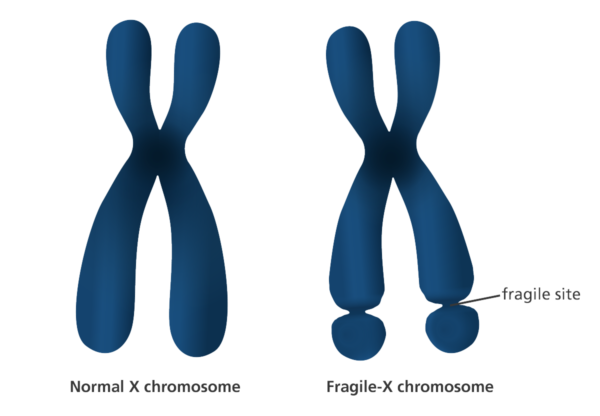Understanding Fragile X
Jul 22, 2021
5765 Views
July is National Fragile X Syndrome Awareness month. It is important to spread awareness about what this condition is and how it is inherited in families. Early intervention is critical to the effective management of Fragile X syndrome. Unfortunately, the vast majority of children – and, sometimes, adults – with Fragile X syndrome go undiagnosed due lack of awareness and limited access to genetics experts to facilitate testing. Apart from the medical implications of not being aware of the prevalence of this condition, there are many stigmas associated with Fragile X Syndrome. Women are blamed in most families for bearing a child who has intellectual disabilities. This not only disturbs the family equation but also affects the women emotionally and usually they end up blaming themselves and carrying guilt for the rest of their lives. Let us all come together as a part of this society to spread awareness so families can make informed decisions.
What is Fragile X Syndrome?
Fragile X Syndrome or FXS is a silently inherited condition, which is the most common inherited cause of intellectual disability in boys, and one of the well-known single gene causes of Autism Spectrum Disorder (ASD). Children with FXS have a gene change in the FMR1 gene. This gene is found on the X chromosome and is characterized by having CGG repeats, normally, between the range of 5 and 40. In children with FXS, these CGG trinucleotides repeats occur more than the normal range exceeding above 200. These are also called full mutations, whereas when the CGG trinucleotide repeats are between the range of 40-200, it is termed as a pre-mutation (PM). In such cases, children have a normal IQ, but sometimes mild intellectual disabilities are also reported. Research shows that 1 in 4000 males and 1 in 8000 females have FXS (Stone WL et. al).

How is FXS inherited?
The term Fragile X comes from when the ‘X chromosome’ in children with FXS appears to be broken or fragile looking like it is hanging together by a thread (see figure below).
 Image Source: https://www.yourgenome.org/facts/what-is-fragile-x-syndrome
Image Source: https://www.yourgenome.org/facts/what-is-fragile-x-syndrome
The FMR1 gene is located on the X chromosome, one of two sex chromosomes. It is passed in families through an X-linked dominant pattern of inheritance, which means that a single copy of a mutated gene on the X chromosome is enough to cause the condition. FXS is severe in males as they have only one copy of the X chromosome, compared against females who have two copies of the X chromosome. That is why females present with a milder form or no signs of FXS mostly only being termed as a carrier.
What are the signs of having FXS?
When babies are born, they generally do not show any unusual signs of having FXS with respect to most parameters like the head circumference, their height and weight. Children with full mutations have severe symptoms. Physical and developmental features start becoming obvious from early childhood. The changes observed in children with FXS are
- Developmental delays such as delay in rolling, sitting, walking, etc.
- Psychomotor delays like being unable to brush their own teeth, take showers, eat with their own hands, etc.
- Intellectual disabilities
- They also have poor expressive language skills
It is estimated that around 30%-60% of children with FXS also have Autism. Characteristic facial changes seen in children with FXS have a long face with prominent ears and flat feet. Another identifying characteristic of FXS in all males is Pubertal Macroorchidism, a term used to describe unusually large testes after puberty, and sometimes even present from childhood.
However, individuals with premutations in the FMR1 gene show conditions like –
Fragile-X Associated Tremor/Ataxia Syndrome (FXTAX)
Premutation in the FMR1 gene causes this genetic condition. This is a neurodegenerative condition associated with difficulty in balancing, memory problems, and tremors during voluntary movements like picking up a pencil, reaching for a glass, etc. Symptoms start usually in the older ages, i.e., after 50 years of age. This condition affects males more severely than females.
Fragile-X Associated Primary Ovarian Insufficiency (FXPOI)
This condition affects women. Ovaries are a part of the female reproductive system, and having a premutation in the FMR1 gene causes reduced function of the ovaries. These premutations are associated with irregular menstrual cycle, infertility, menopause earlier than the average age of 40 years, and elevated levels of the FSH hormone.
How is FXS diagnosed?
When a child starts showing symptoms as mentioned above, which are associated with intellectual disabilities, psychomotor delays, developmental delays, and autism, FXS is considered as a differential diagnosis.
Diagnosis can be confirmed through molecular testing – Multiplex Ligation-dependent Probe Amplification (MLPA), which measures the number of the CGG repeats on the X chromosome. This targeted technique is affordable and effective in detecting the repeats.
Apart from identifying the child as affected or a carrier for FXS, these evaluations and tests help empower families to make informed decisions about the child with FXS as well as for their subsequent pregnancies as well.
How can FXS be managed?
In India, most children with FXS go undiagnosed and do not get the appropriate treatment and care that they need. Multidisciplinary care is required for these children with FXS. Paediatric neurologists along with genetic counsellors play an important role in the correct evaluation of FXS. Currently, there is no cure for FXS. Specialists in occupational therapy, speech therapy, and behavioural therapy offer specific developmental enhancements with age appropriate intervention.

Genetic Counseling
Families with individuals having FXS must set up a genetic counselling appointment to understand their risk of having an affected child. In women having a premutation in the FMR1 gene (re: CGG repeats in the range of 40-200), prenatal testing of the fetus is a recommended option. Set up an appointment with a Genetic Counselor to understand your risk of being a carrier for FXS.

Would you like to speak to a Genetic Counselor? Click here to schedule an appointment.
Care & Support
In families, having a child with challenging conditions, this not only adds physical differences but also has emotional and social consequences. The mode of inheritance tends to add to these stigmatizations. From age-old times, there are many stigmas associated with genetic conditions.
X-linked conditions have a greater implication on women for passing the affected gene to her children. The mother holds herself responsible for passing down these genes to her children. Counseling can help mothers in moving beyond guilt and grief. Support groups of parents of children with FXS can also help parents in ensuring the best possible care for the child. In a country like India, it is essential to increase awareness about the condition in rural and urban areas. In India, NGOs such as the Fragile X Society (https://www.fragilex.in/) help raise awareness and help families.


